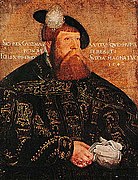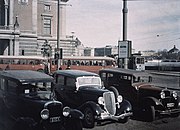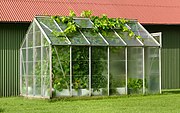Portal:Sweden
|
Välkommen till Sverigeportalen!
Sweden, formally the Kingdom of Sweden, is a Nordic country located on the Scandinavian Peninsula in Northern Europe. It borders Norway to the west and north, and Finland to the east. At 450,295 square kilometres (173,860 sq mi), Sweden is the largest Nordic country and the fifth-largest country in Europe. Its capital and largest city is Stockholm. Sweden has a population of 10.6 million, and a low population density of 25.5 inhabitants per square kilometre (66/sq mi); 88% of Swedes reside in urban areas. They are mostly in the central and southern half of the country. Sweden's urban areas together cover 1.5% of its land area. Sweden has a diverse climate owing to the length of the country, which ranges from 55°N to 69°N. Sweden has been inhabited since prehistoric times, c. 12,000 BC. The inhabitants emerged as the Geats (Swedish: Götar) and Swedes (Svear), which together constituted the sea-faring peoples known as the Norsemen. A unified Swedish state was established during the late 10th century. In 1397, Sweden joined Norway and Denmark to form the Scandinavian Kalmar Union, which Sweden left in 1523. When Sweden became involved in the Thirty Years' War on the Protestant side, an expansion of its territories began, forming the Swedish Empire, which remained one of the great powers of Europe until the early 18th century. During this era Sweden controlled much of the Baltic Sea. Most of the conquered territories outside the Scandinavian Peninsula were lost during the 18th and 19th centuries. The eastern half of Sweden, present-day Finland, was lost to Imperial Russia in 1809. The last war in which Sweden was directly involved was in 1814, when Sweden by military means forced Norway into a personal union, a union which lasted until 1905. Sweden is a highly developed country ranked fifth in the Human Development Index. It is a constitutional monarchy and a parliamentary democracy, with legislative power vested in the 349-member unicameral Riksdag. It is a unitary state, divided into 21 counties and 290 municipalities. Sweden maintains a Nordic social welfare system that provides universal health care and tertiary education for its citizens. It has the world's 14th highest GDP per capita and ranks very highly in quality of life, health, education, protection of civil liberties, economic competitiveness, income equality, gender equality and prosperity. Sweden joined the European Union on 1 January 1995 and NATO on 7 March 2024. It is also a member of the United Nations, the Schengen Area, the Council of Europe, the Nordic Council, the World Trade Organization and the Organisation for Economic Co-operation and Development (OECD). (Full article...) This is a Good article, an article that meets a core set of high editorial standards.
Old Tjikko is an approximately 9,566 years-old Norway spruce, located in the Dalarna province in Sweden. Old Tjikko originally gained fame as the "world's oldest tree". Old Tjikko is, however, a clonal tree that has regenerated new trunks, branches and roots over millennia rather than an individual tree of great age. Old Tjikko is recognized as the oldest living Picea abies and the fourth-oldest known clonal tree. The age of the tree was determined by carbon dating of genetically matched plant material collected from under the tree, as dendrochronology does not work for clonal trees. The trunk itself is estimated to be only a few centuries old, but the plant has survived for much longer due to a process known as layering (when a branch comes in contact with the ground, it sprouts a new root), or vegetative cloning (when the trunk dies but the root system is still alive, it may sprout a new trunk). (Full article...)  Uppsala University (UU) (Swedish: Uppsala universitet) is a public research university in Uppsala, Sweden. Founded in 1477, it is the oldest university in Sweden and the Nordic countries still in operation. Initially founded in the 15th century, the university rose to significance during the rise of Sweden as a great power at the end of the 16th century and was then given relative financial stability with a large donation from King Gustavus Adolphus in the early 17th century. Uppsala also has an important historical place in Swedish national culture, and identity for the Swedish establishment: in historiography, religion, literature, politics, and music. Many aspects of Swedish academic culture in general, such as the white student cap, originated in Uppsala. It shares some peculiarities, such as the student nation system, with Lund University and the University of Helsinki. (Full article...) 
The following are images from various Sweden-related articles on Wikipedia.
This is a Featured article, which represents some of the best content on English Wikipedia.
Henrik Lars Sedin (born 26 September 1980) is a Swedish ice hockey executive and former centre who played his entire 17-season National Hockey League (NHL) career with the Vancouver Canucks from 2000 to 2018. He additionally served as the Canucks' captain from 2010 until his retirement. Born and raised in Örnsköldsvik, Sweden, Sedin and his identical twin brother Daniel played together throughout their careers; the pair were renowned for their effectiveness as a tandem. Henrik, a skilled passer, was known as a playmaker (150+ more career NHL assists than Daniel) while Daniel was known as a goal-scorer (150+ more career NHL goals than Henrik). Sedin tallied 240 goals and 830 assists, for 1,070 points, in 1,330 NHL games, ranking him as the Canucks' all-time leading points scorer. Sedin began his career in the Swedish Hockey League with Modo Hockey in 1997 and was co-recipient, with brother Daniel, of the 1999 Guldpucken as Swedish player of the year. Selected third overall—one pick after brother Daniel—by the Canucks in the 1999 NHL Entry Draft, Sedin spent his entire NHL career in Vancouver. After four seasons with the club, he became the Canucks' top-scoring centre in 2005–06. He has since won three Cyrus H. McLean Trophies as the team's leading point-scorer (from 2007–08 to 2009–10) and one Cyclone Taylor Award as the team's most valuable player (2010). In 2009–10, he won the Hart Memorial Trophy as well as the Art Ross Trophy as the NHL's most valuable player and leading point-scorer, respectively. He was also named to the NHL first All-Star team that year and again in 2010–11, a season that included an appearance in the Stanley Cup Finals, where Vancouver lost to the Boston Bruins in seven games. That summer, Henrik and Daniel were named co-recipients of the Victoria Scholarship as Swedish athletes of the year. Alongside his brother, Henrik was inducted into the Hockey Hall of Fame in 2022. (Full article...) This is a Featured picture that the Wikimedia Commons community has chosen as one of the highest quality on the site.
Subdivisions: Counties of Sweden • Municipalities of Sweden • Provinces of Sweden  History: 1975 Occupation of the West German embassy • Ådalen shootings • Consolidation of Sweden • Early Swedish history • Enlightened Absolute Monarchy in Sweden • Early Vasa era • Industrialization of Sweden • Post-war Sweden • Prehistoric Sweden • Rise of Sweden as a Great Power • Suiones • Swedish Empire • Sweden after the Great Northern War • Sweden and the Winter War • Sweden during late 19th century • Sweden during World War II • Swedish allotment system • Swedish emigration to the United States • Union between Sweden and Norway Politics: Alliance for Sweden • Constitution of Sweden • Foreign relations of Sweden • Government of Sweden • Parliament of Sweden • Riksdag • Swedish general election, 2006 • Swedish general election, 2010 • Swedish neutrality • Swedish welfare Demographics: Education • Ethnic minorities • Languages • Religion • Subdivisions • Cities • People • Healthcare • Immigration Culture: Cinema of Sweden • Cuisine of Sweden • Music of Sweden • Sports in Sweden • Swedish literature • Tourism in Sweden Symbols: Flag • Coat of arms • National anthem
Northern Europe Other countries Discover Wikipedia using portals | |||||||||















































